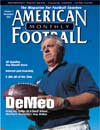AMERICAN FOOTBALL MONTHLY THE #1 RESOURCE FOR FOOTBALL COACHES
Article CategoriesAFM Magazine
|
What a Tangled Web We Have Weaved...The internet has changed the face of coaching.by: Richard Scott © More from this issue Rewind your football clock 30 years, to a time when legendary Alabama coach Paul "Bear" Bryant used preseason practice to install the wishbone in total secrecy and used it to ambush an unsuspecting USC team in the Crimson Tide's season opening 17-10 win over the Trojans. Fast forward that clock to August, 2001, to a time when first-year Alabama coach Dennis Franchione attempted to prepare his team for its season opener against UCLA. Franchione, following an Alabama tradition, opened his practices to the media and a limited number of fans and soon found every little nook and cranny of practice information published for all the world to see, including the UCLA Bruins. Where did the Bruins find this information? From spies watching with binoculars from local school buildings? From UCLA fans posing as Tide fans? From Alabama inside....The full article can only be seen by subscribers.
|
|
|||||||
| HOME |
MAGAZINE |
SUBSCRIBE | ONLINE COLUMNISTS | COACHING VIDEOS |
Copyright 2026, AmericanFootballMonthly.com
All Rights Reserved





